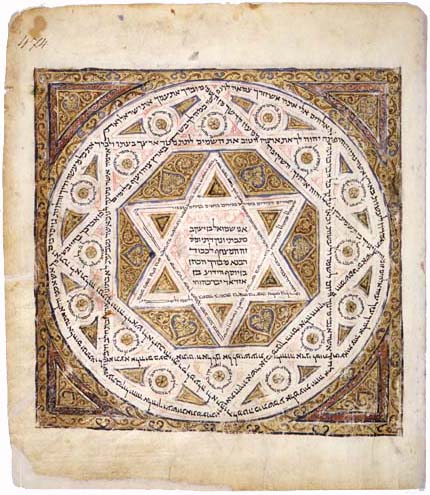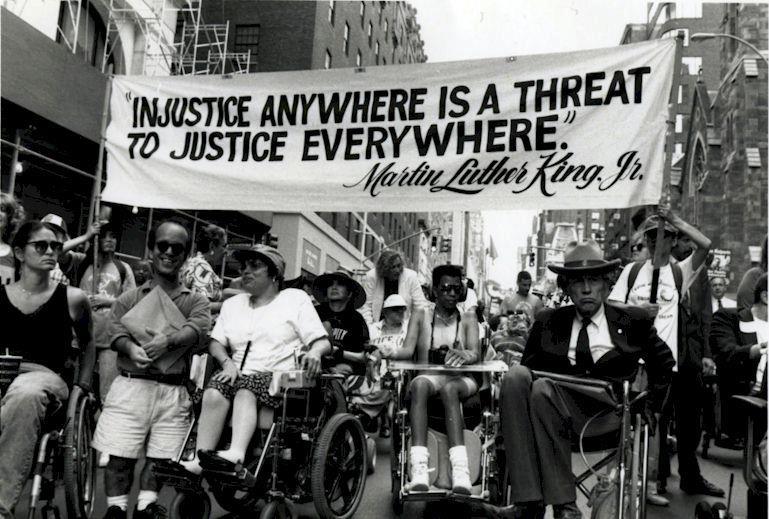Glossary of Jewish Terms and Phrases (L – Z)
For Future Reference
After adding heavily to the glossary A – K, I bring you L – Z. Let me know if I mangled any or missed any big ones!
Lashon HaRa lit. “the evil tongue”: gossip and slander prohibited by halacha, even if true.
Lashon HaKodesh lit. “the holy tongue”: the Hebrew language.
Layn: read or sing from the Torah.
L’chaim: “To Life!”
Lechem: bread

(lechem in open air market in Jerusalem, thanks malka!)
Lev: heart
Licht lit. light: Shabbas or yom tov candles
Litvak or Litvish: of or from Lithuanian Jewry.
Lox: smoked salmon.
Ma’ariv: evening prayer
Machmir: strictly adherent. “they’re not machmir on Shabbas.”
Maccabees: follower of Judah the Maccabee, who led the defeat of the Hellenists celebrated on Hannukah.
Magen David lit. Shield of David: Jewish star.

Mamzer: child of a forbidden union.
Marit Ayin: the appearance of impropiety, or refraining from such. “A shande far di goyim,” “A shame in front of the goyim.”
Matzah (pl. matzot): unleavened bread, esp. eaten on Pesach
Mazel lit. constellation: luck; Mazel Tov lit. (a) good star: “Congratulations!”
Mechitza: partition between men and women in synagouge or other events.
Megillah: Scroll. Used to refer to the books Esther, Ruth, Ecclesiastes, Song of Songs, Lamentations. Also, any long, drawn-out story. “Tell me the whole megillah!“
Melochos: work, esp. the 39 categories of work prohibitted on Shabbas.
Melech/melech: King. Capitalize in reference to G-d, “Melech HaOlam” (king of the world). David Ha melech (David the king).
Menorah: candelabra, esp. for Hannukah.
Mensch (pl. menschen): upstanding person. “What a mensch!”
Meshuggah: crazy. “This is meshuggah!!”
Meshegas: craziness.
Mezuzah: Torah passage on a parchment scroll, placed in an ornamental case and affixed to a doorpost as commanded by Deut 6:9.

Middos: attributes. “He has the neccesary middos for conversion.”
Midrash (pl. midrashim) lit. “retelling”: a story or collection of (often ancient) extra-scriptural Torah stories. A Beis Midrash is a house of learning.
Mikvah: ritual bath. people immerse in a mikvah to convert to Judaism. Women immerse after menstruation, men sometimes immerse prior to Yom Kippur.
Mincha: afternoon prayer.
Minyan: quorum of 10 required for certain prayers.
Mishnah: oral law that (along with its commentary, the Gemara) makes up the Talmud.
Mitzvah: commandment or religious act / good deed. “Bikkur Cholim is a huge mitzvah!”
Mohel: guy who performs circumcisions.
Moshiach lit. “Anointed”: a king or one anointed by G-d for a purpose; or the expected Jewish Messiah, who will rebuild the Beis HaMikdash (Ezekiel 37:24-28, Isaiah 33:20, Micah 4:1, Ezekiel 40-48) gather all Jews to Israel (Isaiah 43:5-6, Isaiah 11:12, Isaiah 27:12-13, Jeremiah 23:3, 30:3, Zechariah 10:6, Ezekiel 37:21-22) and bring world Peace (Isaiah 11:6, 33:20, Micah 4:3, Ezekiel 39:9, Isaiah 2:4) as well as Universal Knowledge of one G-d (Jeremiah 31:33, Zechariah 8:23, 14:9, 14:16, Isaiah 11:9, 40:5, Ezekiel 37:24 Zephaniah 3:9.)
Mussar: traditional moral tale. See Mussar Movement.
Muttar: Halachically permissible.
Nachas: pleasurable pride, esp. parental pride for children. “She gets such nachas from her children.”
Nevi: prophet.
Niggun: tune to which liturgy is sung; wordless melody sung by hasidim.
Nosh: snack [noun and verb].
Nu (Yid.): “So?” “Well?”
Olam: world; universe; everything; forever. Olam HaBah is The World to Come.
Oleh (pl. olim) lit. ascender: immigrant to Israel.
Oy, gevalt:“Oh, drat!”; “Oy, help!”
Oy, vey: lit. (it) hurts: “Oh, no!”
Parsha: portion, esp. weekly reading of Torah.
Parve lit. neutral: neither meat or dairy. For example, fish.
Perek: verse.
Poskin: rule on a halachic matter.
Posek: rabbi qualified to poskin halacha.
Pesach: Passover, the spring holiday commemorating Hashem redeeming the Jews from Mitzrayim (slavery / Egypt) characterized by the Seder, and destroying all chametz (leavened bread) to only eat matzah (unleavened bread), as the bread didn’t have time to rise when fleeing Egypt.
Peyot: the sidelocks worn by Charedi men.

Pirkei Avos: “Ethics of the Fathers,” the Mishnah’s book of sages’ ethical maxims.
Plotz: (Yid.) explode, esp. with intense emotion. “when your mom finds out, she’s gonna plotz!”
Pogrom: violent, anti-Semitic raid of a Jewish village or area, esp. in Europe.
Purim: spring holiday commemorating the events of the Book of Esther, when after the first destruction of the Temple and the Babylonian exile, the Jews, led by Esther, did tschuva, fasted and prayed and merited the land again.
Pushka: box or canister for collecting tzedekah. Parents give decorative pushkas to their children as gifts to instill the values of tzedekah in them.

Ra: evil or bad.
Rasha: wicked person.
Rav/Rebbe: big status titles for rabbis.
Rebbetzin: wife of a rabbi.
Rishonim: post-Gemara-era commentators, like Rashi, Maimonides and Nachmanides.
Rosh Chodesh: first day of the new month
Rosh HaShanah lit. head of the year: Jewish New Year.
Rosh Yeshiva: head of a yeshiva.
Ruach HaKodesh: holy spirit.
Sabra: cactus fruit. Also, native Israeli.
Sanhedrin: rabbinical supreme court of 70 sages.
Schlemazel: luckless person.
Schlemiel: bumbler, one who “can’t do anything right.” They say a schlemiel is the one who spills soup and the schlemazel is the one who gets soup spilled on him.
Schlep: verb — carry; drag, lug; drag one’s feet; travel a great distance; noun — lazy one; unkempt person.
Schlump: verb, slump, flop. noun, stoop-shouldered person.
Schmaltz: chicken grease, oil; maudlin sentimentality. “That movie was too schmaltzy!”
Schmeer: as a verb, to spread, e.g. the cream cheese on your bagel; also, as a noun, that which you spread on something, e.g. “I’ll have a piece of challah with schmeer.”
Schmooze: cruising to small talk or chat.
Schmuck , schmo, schlong, putz: one of the many Yiddish insult words meaning penis. as Elijah Wood’s character says in the recent movie Everything Is Illuminated, Eskimos see snow all the time, so they’ve developed hundreds of words for types of snow, and Yiddish has hundreds of words for penis for a similar reason, LOL!
Schmeggege: a doofus.
Schmutz: filth, scum.
Schnorrer: beggar.
Schnook: unscrupulous one; cheater, crook. “He schnookered me!”
Schpiel: drawn-out story; sales pitch.
Schtick: bit, piece; comic act.
Schtreiml: round, big fur hat worn by hasidim.

Sefer: book, esp. religious book. Sefer HaTorah.
Sephardi: Jews from the Iberian diaspora and their North African and Middle Eastern descendants.
Shabbas: the Sabbath, the central observance of Judaism, which overrides even high holy days.
Shacharit: morning prayer
Shadchan: matchmaker
Shalom: peace; “Hello/Goodbye”
Shalom Aleichem lit. peace to you: a warm greeting (response is “aleichem, shalom”)
Shalom bayit lit. peace of the house: domestic harmony.
Shanda: shame, disgrace.
Shekhina: G-d’s presence. A key purpose of Judaism is to do mitzvos to cause the shekhina to dwell among us, and avoid sins that push the shekhina away.
Shechita: kosher slaughtering; shecht, slaughter in a kosher manner.
Shema lit. Hear (O, Israel): the central Jewish prayer
Sheitel: wig, esp. for married women to cover their hair.
Shidduch: match for dating or marriage (see shadchan). “I need a shidduch” or “he brought a shidduch with him to the show.”
Shiur: a lecture or class. verb, as in “he was born to shuir!” or noun, as in, “great shiur!” or “he (classmate) was in my shiur.”
Shiva: period of mourning observed for seven days after a family member’s funeral. “Sitting shiva”.
Shoah lit. destruction: The Holocaust.
Shochet: kosher butcher.
Schuckle: to bob back and forth with intensity during prayer.
Shtetl: Eastern European Jewish ghetto village created by bans on Jews anywhere else.
Shul: synagogue
Shulchan Aruch lit. set table: Code of Jewish Law
Siddur: daily prayerbook
Simcha: happiness; special happy occasion, esp. wedding, bar mitzva, etc.
Simchat Torah: holiday celebrating the beginning of the annual Torah reading, in autumn
Slichot: prayers of repentance said around High Holidays
Smicha: rabbinic ordination
Sichos: rabbinic discourses
Succah (pl. succot): outdoor booth lived in on Succot; Succot, harvest festival, in autumn.
Tallit: prayer shawl.
Tashlich: Rosh HaShanah practice of throwing bread, etc. into water, symbolically casting away sins
Tefillah: prayer. the origin of the word tefillah is “to judge oneself.”
Tefillin: Torah passages on parchment scrolls, placed in small boxes and affixed with leather straps to the head and arm during prayer, as commanded in Deut 6:8.
Tehillim: Psalms
Tikkun Olam: the spiritual / physical repair and completion of the world, a key goal of Judaism.
Todah (rabbah): “Thank you (very much)”
Trief: lit. torn, like carrion: not kosher
Tzaddik: righteous person.
Tzedekah lit. justice: charity, but the English word charity, with its connotations of an act of generousity, is not tzedekah. The word and the concept tzedekah means justice, doing the right thing because you are commanded to (Deut. 15:7-8) and it’s not your money, it’s G-d’s.
Tzitzis: fringes representing the 613 mitzvos worn on the corners of Jews’ four-cornered garments; the garment and fringes together

Tzniut: modesty, esp. of dress
Viduy: confession to G-d of a sin
Yartzeit: anniversary of a death
Yasher Ko’ach lit.= (go) straight, (as) strong: “Good job! Keep up the good work!”
Yenta: gossipy woman.
Yerushalayim: Jerusalem
Yetzer tov / yetzer hara: good/evil inclination.
Yid (pl. Yidden): Jew.
Yiddishkeit: Jewishness
Yom Tov lit. good day: holiday
Zecher: in remembrance of
Zecher tzadik livracha (abbr. ZT”L): “(May) the memory of the righteous (be) for a blessing.” Said of deceased tzaddikim.
Zechus: merit. this blog written as a zechus for a refuah shleima (speedy recovery) of my mother, Rut Leah bas Shema Bera.
Zeide: grandfather
